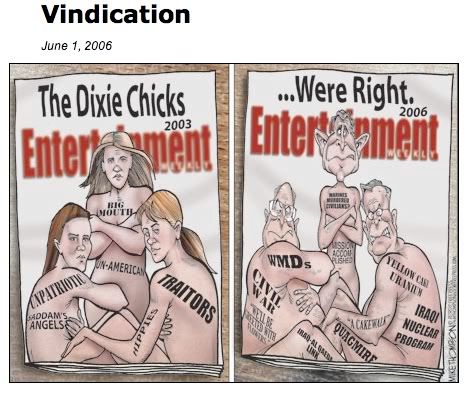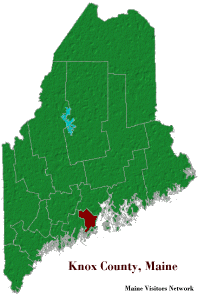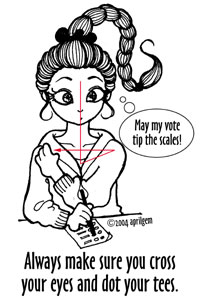
Supremes sing of Global Warming
Well, not quite … but the High Court did hear oral arguments in the case of Massachusetts v. EPA today, creating the final showdown between the Bush Administration and the coalition of states and environmental groups over everybody's favorite gas – carbon dioxide.
Brief recap: Clean Air Act …. CO2 … Global Warming …. Kittens die …
At the outset, I'm pleased to report that the Court's website has already posted a .pdf
transcript from Wednesday's oral argument. Before we get too far …

Displacer of cute native birds
This morning I received a short ride from the auto glass replacement store to my office from one of the employees – a 60s-ish local fellow who presented as a lifelong tradesman who likely never spent considerable time away from the Kennebec Valley region, except maybe to fight in a war.
After an innocent-enough comment about it being a "warm enough morning," we started to chat about the changing climate: how his dog and cat were brutalized by ticks last summer, how our area has become home for more and more cardinals and orioles than he recalled from his childhood, and how he thought he never had to worry about diseases carried by mosquitoes once malaria was officially contained.
"Any way you look at it, the climate's changing," he said to me. "I don't care what they say. Just look around."
There it is. The Democratization of Global Warming outrage … if only muffled at this point. What it means may not be clear right now, but expect that the ambiguity may begin to fade once the Democratic Congress gets crackin' and/or the Supreme Court weighs in ….

This was my driver ... like, for pretend.
A little self-refentiality here, as I've followed this sucker since before it was first brought to the U.S. District Court for the District of Connecticut. Here is my most recent post, when the Court agreed to hear the case.
Here's an overview of the criticism brought against the US Court of Appeals for the DC Circuit when it rule against the states' claims.

From EPA.gov – actually titled
"Family Enjoying Clean Air"
To the Links:
New York Times' Linda Greenhouse offered her read here:
On one level, the argument was about the meaning of the Clean Air Act, which the Environmental Protection Agency maintains does not treat carbon dioxide and other heat-trapping gases as air pollutants and thus does not give the agency the authority to regulate them.Greenhouse took up the banner of those singing the Court's mantra of the Moment: What Would Kennedy Do?
On another level, the argument was about whether the dozen states, three cities and many environmental groups that went to federal court to challenge the agency’s position had legal standing to pursue their lawsuit.
And on still another level, the courtroom action was an episode in a policy debate that began well before this case arrived on the Supreme Court’s docket and that will continue, in the political sphere, no matter what the justices decide.
By the end of the argument, that continuing debate appeared the only certain outcome.
By the end of the argument there appeared a strong likelihood that the court would divide 5 to 4 on the standing question, with Justice Anthony M. Kennedy holding the deciding vote. His relatively few comments were ambiguous. Early in the argument he challenged the assertion by Mr. Milkey, the states’ lawyer, that the case “turns on ordinary principles of statutory interpretation and administrative law” and that there was no need for the court “to pass judgment on the science of climate change.”No question.
That was “reassuring,” Justice Kennedy said. But, he added, “Don’t we have to do that in order to decide the standing argument, because there’s no injury if there’s not global warming?”
The Times offered this editorial, urging that:
A plain reading of the Clean Air Act shows that the states are right. The act says that the E.P.A. “shall” set standards for “any air pollutant” that in its judgment causes or contributes to air pollution that “may reasonably be anticipated to endanger public health or welfare.” The word “welfare,” the law says, includes “climate” and “weather.” The E.P.A. makes an array of specious arguments about why the act does not mean what it expressly says. But it has no right to refuse to do what Congress said it “shall” do.
Beneath the statutory and standing questions, this is a case about how seriously the
government takes global warming. The E.P.A.’s decision was based in part on its
poorly reasoned conclusion that there was too much “scientific uncertainty” about global warming to worry about it. The government’s claim that the states lack standing also scoffs at global warming, by failing to acknowledge that the states have a strong interest in protecting their land and citizens against coastal flooding and the other kinds of damage that are being projected.

NPR's Nina Totenberg provided this recap of today's oral argument, complete with Justice Scalia's sure-to-be remembered "supremely candid moment:
… Justice Scalia was questioning the Massachusetts Assistant Attorney General Milkey.Dahlia Lithwick gave her take on NPR's Day to Day but her written take in Slate takes a reflective Gen-X-ee angle on the debate:
Scalia pointed to the government's assertion that carbon dioxide is not a pollutant. "But," said Scalia, "You say it is, once it goes up into the stratosphere and contributes to global warming."
"Respectfully, your honor," Milkey answered, "It is not the stratosphere. It's the troposphere, from the ground up to nine miles above."
"Whatever," replied Scalia. "I'm not a scientist. That's why I don't want to have to deal with global warming, to tell you the truth."
On that question – whether the courts should be involved at all – the Supreme Court seemed closely divided, with Justice Anthony Kennedy the likely swing vote.
If there is anything stranger than writing up your story on global warming in a T-shirt … in late November … in the District of Columbia, I can't quite think what it is.Another few cutsy points by Lithwick (Winona Ryder in Reality Bites or
Parker Posey):
Chief Justice John Roberts—whose distaste for the baby penguins, the polar ice caps, and anything else sought by the state of Massachusetts today knows no bounds—characterizes the scientific reports in this case as "spinning out conjecture on conjecture" about how EPA regulations might lead to technological changes and regulations by other countries.The Other Media Heavies
…
Now, maybe it's because I have a toddler at home, but the EPA's argument, presented by Deputy Solicitor General Gregory Garre, quickly sounds very familiar.1) I can't clean it up; 2) Even if I could, I don't want to clean it up; 3) You can't make me clean it up; and 4) China is making an even bigger mess. How come China never has to clean it up? When and if all that fails, the EPA, like my son, just puts its hands over its eyes and says there is no mess in the first place.
…
There's something incongruous about a Bush administration suddenly gone frantic over the possibility that its solution to a problem may not be the single, perfect one. If we were still arguing about the war on terror or child pornography, the government would be taking the "every little bit helps" approach. But since we're only talking about flash floods, hurricanes, water pollution, and rising sea levels, we hear quite the opposite today: "What difference can one little country make? We're all gonna die anyhow!"
Washington Post's Charles Lane.
USA Today's Joan Biskupic.
The Christian Science Monitor's Warren Richey provides a more circumspect view.
While at the CSM, seethis piece about federal-state power balance. I hate that I always forget to check in with this paper.
And a few from Mother Jones, Koshlan Mayer-Blackwell asks Whats at Stake in Massachusetts? while a colleague charges Let Them Eat CO2.
The San Francisco Chronicle provides this editorial which locates the politics of the matter:
But this case will be heard before a conservative-majority court, which bridles at the notion of judicial activism and expanded federal duties.The court could pull a surprise decision and direct the EPA to do its job in diminishing greenhouse gases. Or it could refuse this assertive role and push the loaded decision back to legislators, not judges, to decide.
Would that be a defeat for environmental sanity? With Republicans running Congress and the White House, it would be. But Democrats now have control of Congress, meaning that serious environmental lawmaking is possible.
A loss before the high court -- hardly guaranteed at this point -- would take the global warming fight to Congress. For six years, there wasn't a prayer for emission controls. That could all change now.

Nuts and Bolts,
for those of you still with us
When the Clean Air Act was enacted, it imposed a duty on EPA to regulate all ambient air pollutants generated by numerous mobile or stationary sources and endanger the public health or welfare. It also permits third party suits against EPA for any failure to perform an act it is duty bound to perform.
An air pollutant is any substance emitted into the ambient air. Mobile sources are sources that move (cars, trucks, etc.) and stationary sources are all sources that don't move (factory smokestacks). Endangering public health means causing harm to the health of … well, the public. Endangering the public welfare is broadly understood to mean any affect to the human environment, which is understood to include water, crops, animals, weather, and climate.
Here's the rationale for forcing CO2 regulation offered by the states when it first petitioned EPA.
 Clinton's EPA said carbon dioxide was a pollutant on three occasions, but the most important of these statements was a formal memorandum issued by then EPA General Counsel Jonathan Z. Cannon (at right, dashing with paddle)
Clinton's EPA said carbon dioxide was a pollutant on three occasions, but the most important of these statements was a formal memorandum issued by then EPA General Counsel Jonathan Z. Cannon (at right, dashing with paddle)in April 1998 to provide legal support for then Administrator Carol Browner's (at left, confident or pensive) claim that CO2 fit the bill.
 Finally, Cannon's successor Gary S Guzy followed-up with this testimony before a House subcommittee.
Finally, Cannon's successor Gary S Guzy followed-up with this testimony before a House subcommittee.Then came Bush and with him, a replacement General Counsel who issued this memo in August 2003 renouncing any earlier recognition of CO2 as a pollutant. The Bush EPA followed sooner after with this denial of the States request to regulate automobile CO2 emissions, citing the lack of effect held by the Clinton Administration's pronouncements.
From there, it's all in the court documents … final agency actions and standing and bears, oh my! And one day, it landed on the laps of three Judges of the D.C. Circuit Court of Appeals. A bunch more time passed and here we sit.
And there's only one way to end a tale of this kind:
The Supreme Court will issue a ruling in the case some time before its June 2007 recess.





























